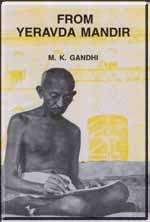
P.O. SEVAGRAM, DIST.WARDHA 442102, MS, INDIA. Phone: 91-7152-284753
FOUNDED BY MAHATMA GANDHI IN 1936
FROM YERAVDA MANDIR [Ashram Observances]
Translated from Gujarati by : Valji Govindji Desai

FROM YERAVDA MANDIR
[Ashram Observances]
Table of Contents
- To The Reader
- Preface
- Truth
- Ahimsa or Love
- Brahmacharya or Chastity
- Control of the Palate
- Non-stealing
- Non-possession or Poverty
- Fearlessness
- Removal of Untouchability
- Bread Labour
- Tolerance, i.e. Equality of Religions-I
- Tolerance, i.e. Equality of Religions-II
- Humility
- Importance of Vows
- Yajna or Sacrifice
- More About Yajna
- Swadeshi
About This Book
Written by : M. K. Gandhi
Translated from Gujarati by : Valji Govindji Desai
First Edition :1,08,000 copies 1932
ISBN : 81-7229-135-3
Printed and Published by : Jitendra T. Desai
Navajivan Mudranalaya,
Ahemadabad-380014
India
© Navajivan Trust, 1932
Download
Chapter 11: Tolerance, i.e. Equality of Religions-II
I would linger yet a while on tolerance. My meaning will perhaps become clearer, if I describe here some of my experiences. In Phoenix we had our daily prayers in the same way as in Sabarmati, and Musalmans as well as Christians attended them along with Hindus. The late Sheth Rustomji and his children too frequented the prayer meetings. Rustomji Sheth very much liked the Gujarati bhajan, 'Mane valun,' 'Dear, dear to me is the name of Rama.' If my memory serves me right, Maganlal or Kashi was once leading us in singing this hymn, when Rustomji Sheth exclaimed joyously, 'Say the name of Hormazd instead of name of Rama.' His suggestion was readily taken up, and after that whenever the Sheth was present, and sometimes even when he was not, we put in the name of Hormazd in place of Rama. The late Husain, son of Daud Sheth, often stayed at the Phoenix Ashram, and enthusiastically joined our prayers. To the accompaniment of an organ, he used to sing in a very sweet voice the song 'Hai bahare bagh,' 'The garden of this world has only a momentary bloom.' He taught us all this song, which we also sang at prayers. Its inclusion in our Bhajanavali is a tribute to truth-loving Husain's memory. I have never met a young man who practised Truth more devotedly than Husain. Joseph Royeppen often came to Phoenix. He is a Christian, and his favorite hymn was 'Vaishnava jana', 'He is a Vaishnava (servant of the Lord), who succours people in distress.' He loved music, and once sang this hymn, saying 'Christian' in place of Vaishnava. The others accepted his reading with alacrity, and I observed that this filled Joseph's heart with joy.
When I was turning over the pages of the sacred books of different faiths for my own satisfaction, I became sufficiently familiar for my purpose with Christianity, Islam, Zoroastrianism, Judaism and Hinduism. In reading these texts, I can say, that I was equiminded towards all these faiths, although perhaps I was not then conscious of it. Refreshing my memory of those days, I do not find I ever had the slightest desire to criticize any of those religions merely because they were not my own, but read each sacred book in a spirit of reverence, and found the same fundamental morality in each. Some things I did not understand then, and do not understand even now, but experience has taught me, that it is a mistake hastily to imagine, that anything that we cannot understand is necessarily wrong. Some things which I did not understand first have since become as clear as daylight. Equimindedness helps us to solve many difficulties and even when we criticize anything, we express ourselves with a humility and a courtesy, which leave no sting behind them.
The acceptance of the doctrine of Equality of Religions does not abolish the distinction between religion and irreligion. We do not propose to cultivate toleration for irreligion. That being so, some people might object, that there would be no room left for equimindedness, if every one took his own decision as to what was religion and what was irreligion. If we follow the law of Love, we shall not bear any hatred towards the irreligious brother. On the contrary, we shall love him, and therefore either we shall bring him to see the error of his ways, or he will point out our error, or each will tolerate the other's difference of opinion. If the other party does not observe the law of Love, he may be violent to us. If however we cherish real love for him, it will overcome his bitterness in the end. All obstacles in our path will vanish, if only we observe the golden rule, that we must not be impatient with those whom we may consider to be in error, but must be prepared, if need be, to suffer in our own person.